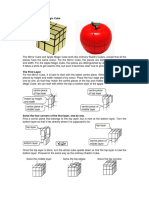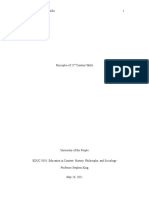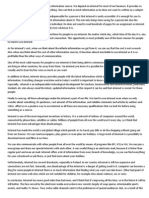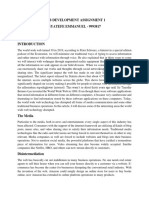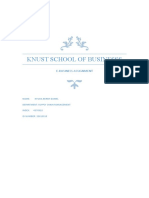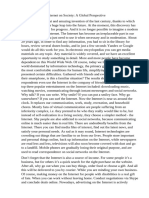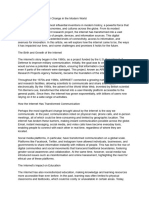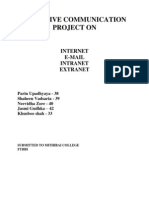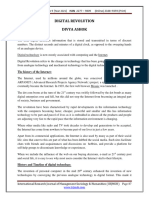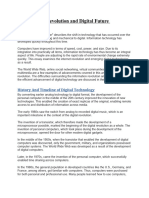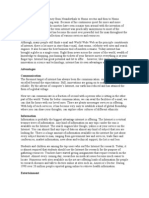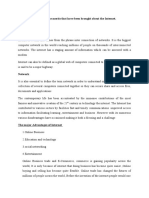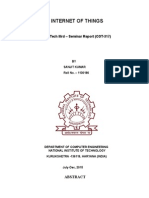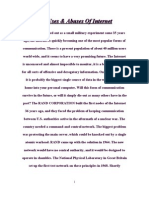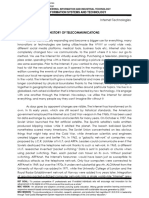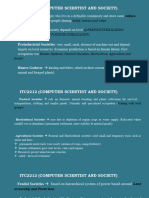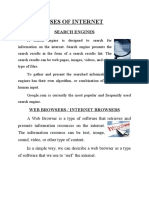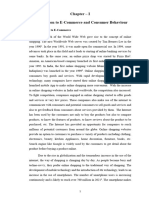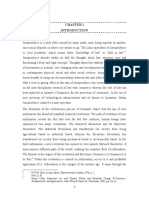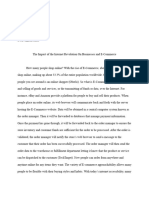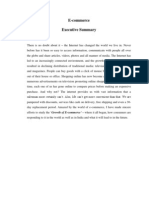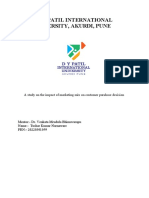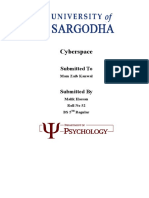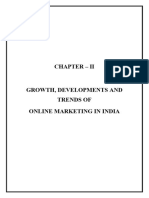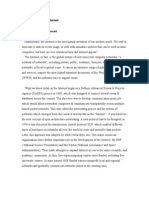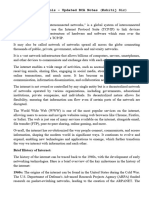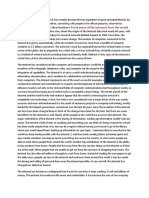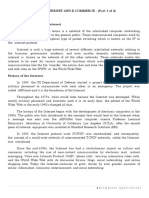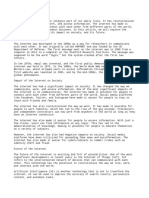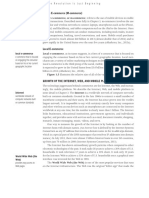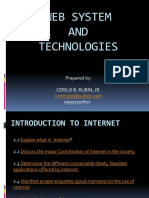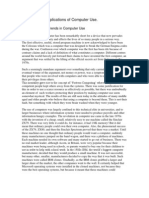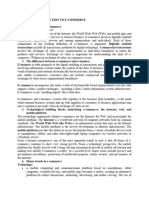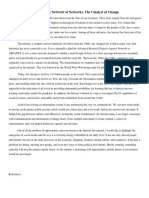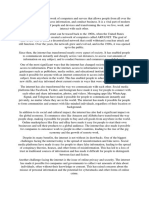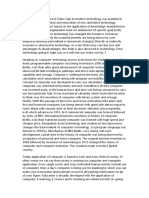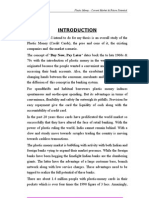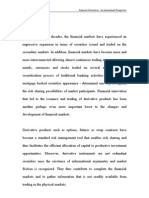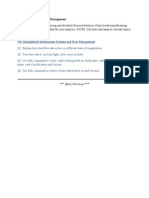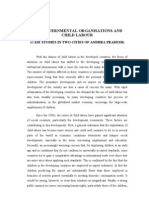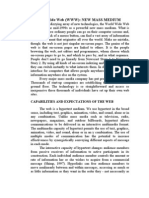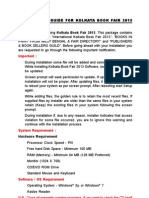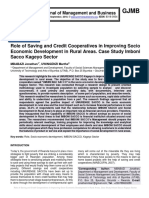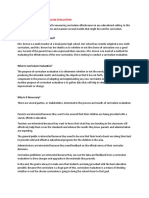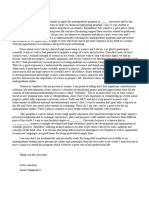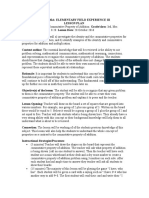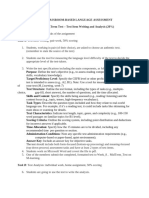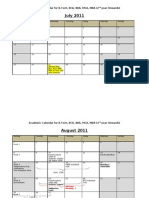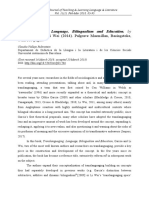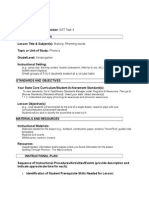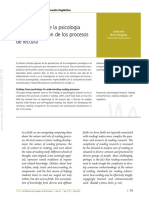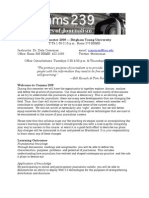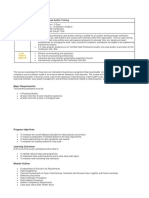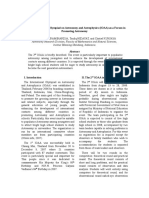Internet and Its Impact On The Society
Internet and Its Impact On The Society
Uploaded by
अंजनी श्रीवास्तवCopyright:
Available Formats
Internet and Its Impact On The Society
Internet and Its Impact On The Society
Uploaded by
अंजनी श्रीवास्तवOriginal Title
Copyright
Available Formats
Share this document
Did you find this document useful?
Is this content inappropriate?
Copyright:
Available Formats
Internet and Its Impact On The Society
Internet and Its Impact On The Society
Uploaded by
अंजनी श्रीवास्तवCopyright:
Available Formats
Internet and Its Impact on the society
CONTENTS
Internet and Its Impact on the society
INTERNET - ITS IMPACT ON SOCIETY
(1) Communication - Its origin and development It was the dawn of human society when man started to communicate to his fellow-man. Later the interactions and exchange of ideas among the men led to the growth of communication. The development and advancement of this communication and sharing of information resulted in
advancement of human civilization. Through millions of years, the upsurge in scientific developments and inventions specifically during the nineteenth and 20th century led to the birth of electronics which started to play a vital role to mankind. Today, in the advent of 21st century if we are to mention some of the most important scientific achievements, computer will, not doubt, find its place as the single most event which some decades before was a simple computing system invented for the purpose of some statistical information for the American military. It has now developed into an all pervading electronic device with a global impact. The technology which has revolutionized the information and communication system in the present day world is known as information technology. In the present day world, getting information on sports, politics, wars and medicines, seeing movie premiers, listening to songs,
Internet and Its Impact on the society
accessing libraries, doing business transactions, making friends and last but not the least, making money, is just a mouse click away. This has been made possible by the Internet. Internet And Its Coverage The Internet is made up of hundreds of thousands of separate networks, each connected in some way to a backbone that moves data from one network to another. The backbone is formed by the biggest networks in the systems, owned by major Internet Service Providers (ISPs). There are about a dozen major backbones in the US alone and many more in other countries. Every backbone has at least one point where it exchanges data with another backbone. As a result, when a local area network (LAN) connects to a backbone, people using it automatically gain access to the entire system. Thus, one can send a message from a computer that is connected to the backbone and that is the Internet. The Internet, therefore, with its world wide reach and being a faster, better and cheaper medium of communication, it is only natural that we use this medium to do business. And conducting business via the electronic media is known as e-commerce. Time is money. And probably the quickest way to save time and create business, thereby generating income, is through e-
Internet and Its Impact on the society
commerce. Companies are fast discovering that e-commerce is where the business is and this has led to its implementation in many important business sectors. The ability to conduct critical back-office transactions in a fast, secure and reliable way has become a major part of the manufacturing, retail and
transportation industries. It is rapidly being adopted in other vertical market sectors as well. Without a doubt, the Internet is ushering in an era of sweeping change that will leave no business or industry untouched. In just three years, the Net has become a vast communication and trading centre, where some 90 million people swap information or strike deals around the world. Imagine, it took radio more than 30 yeas to reach 60 million people, and television 15 years. Never has a technology caught fire so fast. Thus IT is one of the most important scientific determinants of social change in our time. It has been rightly said by John Diebold, 1984. Technological innovations have often led to changes in society. The technology is changing far more rapidly than the rules that are supposed to contain it, often leaping over national as well as regulatory boundaries. Dealing as they do with the principal determinant of human organizationinformation and its communication this technology promises to change the very fabric of society. e-Commerce
Internet and Its Impact on the society
Forecasts show $ 100 billion in electronic commerce this year in the United States, rising to $1 trillion by 2002. The Web levels the playing field for businesses. The World Wide Web (www) clearly offers real commercial advantages over many alternatives in the physical world, at once allowing upstarts to instantly reach global markets and huge conglomerates to tailor products for individual consumers. One of the main powers of the Internet is that it allows businesses to use visual information from configurations of a new computer to photographs of blue jeans to airline schedules to
communicate more efficiently than ever before to sell products and services. Intel Corp., the chip maker, demonstrated recently how a travel site could offer virtual tours of exotic destinations. With a slick Web site, any new company can at least appear to have all the sophistication of an established giant. Wall Street has played the biggest role in fanning the ecommerce euphoria, bidding up Internet related stocks to previously unattainable heights. With the frenzy, investors have also changed the way they value stocks. Web retailer Amazon. Com Inc, which sells books, music, videos and home-improvement products, is a blue chip Internet stock-even though it has no short term plans to turn a profit. Thus Internet companies are engaged
Internet and Its Impact on the society
in a huge grab for customers, spending millions from their stock offerings on marketing campaigns. e-commerce is a beast with two heads. On one side are businesses selling to consumers, the America Online, Amazon, com model. On the other is businesses selling to businesses. The business to business segment accounts for the most business on the Internet and almost all companies are supplementing their traditional ways by adopting this new medium. The business to consumer segment is much hyped about in ecommerce. It is a direct selling or retailing model where the company directly interacts with the consumer and sells its products over the Internet. Commerce web sites today are the equivalent of unattended stores with items for sale displayed on shelves. They are virtual shopping malls selling everything under the Sun, from groceries to cars. For businesses, the vaunted attractions of e-commerce are clear. No warehouses, no waiting, no guesswork. Rather than
stockpiling what it believes will sell, a retailer can simply respond to the orders that stream in over the Web. Instead of setting a price based on past history, a seller can see in moments what buyers are willing to pay. Instead of hoping that advertising reaches the right buyer, a company can use the advertising
Internet and Its Impact on the society
reaches the right buyer, a company can use the information provided by the Web to target exactly the relevant people. E-mail Electronic mail or e-mail is a method of sending or receiving messages electronically over the Internet. E-mail reaches the recipient whether they are a feet away or thousand of miles away. When the telephone was invented, somebody said that it would be a luxury and the masses would not be able to use it. A few decades later, he must have been eating his words. Today, he does not think for a second even before asking for somebodys phone number. When Internet-based email became available for public use, similar doubts were raised. The net is no longer an entertainment play thing out a day to day communication tool. Today, every business card gives pride of place to the e-mail address. Clearly, the days of e-mail are here. So much so that vendors are trying to outdo each other in order to corner a fair share of the e-mail market. Let us delve into the humble background of e-mail and what it has in store for us that may enable us to use it more effectively. E-mail enables coworkers to share ideas and documents even when they are in far flung locations new research by two professors raises warning flags. Their work shows that E-mail is as much a social phenomenon as
Internet and Its Impact on the society
it is a technological implications are not carefully considered and managed. E-mail can turn into a destabilizing force in an organization. E-mail is the most politically potent technology ever invented says Celia t. Romm, Associate Professor of business systems at the University of Wollongong in Australia. Education and Entertainment The educationist Allan Ellis once stated Using computer in education is not learning about computers but is learning about education. So the very use of computer has changed the aspect of education. The traditional industry oriented education is evolving into information oriented education. In the year 2000, around 15,000 television channels will be available across the world. Libraries will become navigation centres for the various media and the book will be replaced by the video disc and audiovisual interaction superseding reading. We are in the process of extending our brains complex interconnections out into the world. The world organism will become a world in the head with the nervous system as its communication network. That is to be seen in the light of Internet growth rates-with around 50 million users and a monthly increase of 10 per cent and of the diagnosis that by the year 2000, 25 per cent of scholarly publications will probably exist in digital form. All
Internet and Its Impact on the society
of our societys constituent system culture, scholarship, work, politics, education, transportation are already affected by
changes in computer networking. We think of tele-jobs and teleteaching, participate in video conference, and reflect on the modifications in democracies. Human beings will no longer move around: the computer brings all the necessary information wherever it is required. All the volumes of Encyclopaedia Britannica can be downsized in a single floppy disc. Many of the colleges and universities of the world are changing their teaching methods from the traditional classroom oriented to online system. A student now can learn sitting in his home by clicking a mouse in his home PC. Distance education has now changed from postal system to on-line system. A student desirous of seeking admission to any reputed
college/university of the world is not required to make repeated correspondences with them for a long period. Instead all the relevant information can be available from the Internet. Entertainment The Internet has not only brought a radical change in the entertainment world but also revolutionalised it. Various musical, choreographic programmes, movies, computer based chess and
Internet and Its Impact on the society
bridge competitions have opened a floodgate of entertainments to man. Computer technology is fast becoming the new weapon for devising strategy in international football and setting old debates. France 98 promised to be the most spectacular World Cup. But amid the superstars and high profile coaches, the advent of modern technology is a new factor that has been added to the games equation. Computers cant make footballers faster or stronger. But like a good coach computer technology can help each player and each team maximises its potential on the field. At the end of the day, that makes for a better game of soccer. France may be a long way away, but with a personal computer and a connection to the Internet, everything from an authentic France 98 T-shirt to the latest match scorecard, are only a mouse click away. France 98 may survive without Romario, but without information technology, the worlds largest sporting event would come to a halt. Computers are everywhere at the Cup. From email to the Internet from desktop publishing to drug testing, computers will be used to conduct all facets of the event. Three multinational technology corporations. Sybase, EDS and Hewlett Packard (all of whom have branches in India), have teamed up with France Telecom to develop an expansive web of network computing throughout the country for the global event. For the
Internet and Its Impact on the society
2.5 million fans who will attend the matches, everything from ticket sales, to hotel bookings, to stadium security, are being managed by Score, a programme developed exclusively for the World Cup. The rationality of the scientific world is constantly busy unveiling the reality behind myths in all facets of life and football has become its newest beneficiary. Friedman, an aeronautic engineer and Kotas, a computer programmer, paired up to develop Second Look at Soccer a computer software which provided unique statistical information regarding any match. The ideas used to develop Second Look have their origins in a software which monitors tactical air warfare. Working on the theory that the most complex type of movements could be condensed down to countless, repetitive motions, Friedman and other engineers developed a novel approach to analyse aerial combat. Afterwards, Friedman, who had a passion for the game of soccer thought that his findings could be useful for the game with the help of Kotas programming skills, the duo tailored the software to meet the strategic needs of the soccer world. Brazilian star, Romario, had something to say to his coach Carlos Albet Parriers after the semi-final match in 1994. Defending his poor performance on the field, Romario charged that he wasnt receiving enough passes. Parreira knew who to consult to verify
Internet and Its Impact on the society
the complaint. Friedman Kotas, after their second look of the match, discovered that Romario had received no less than 45 passes. The striker had to admit to his fault. Impact on Society IT is one of the most pervasive technologies and it has effects both positive and negative on all aspects of life. Positive Impacts (a) The world in a room: 20 years ago Arthur C Clarke had stated that 90 percent of the average executive business could be done without having home by the use of equipment that is available on the an experimental basis. Max Weber pointed out that people in rural societies could not know their neighbours as well as people in traditional rural societies. The urban Indian society is retreating indoors. Work is done at home on computer floppies can be sent through courier, banks can be called up to confirm payment, and in the free time people prefer watching television or else chat on the Net. And if at all it is required to go out, the cars can be used. (b) The Global village reality: Like the industrial evolution 200 years ago, the Internet is having a profound effect on business and society, and what has happened so far is only the tip of
Internet and Its Impact on the society
the iceberg. The Internet has in the true sense, made the global village a reality. It has not only made communications easier and cheaper than ever before but is changing the way corporations are run and how they market services and products. Advantages of the Internet have big implications for business and individual consumers. As phone charges tumble, competition will become much more intense. At the same time, there will be new opportunities for market expansion as users take advantage of the new value added services and cheaper prices. (c) Productivity: In the era of competition improving productivity by deploying information systems has become a trend with most successful companies. A vital aspect in increasing productivity of an organization lies in the timely dissemination of critical information to those who need them. A strong telecommunication network with high bandwidth transmission, also plays an important role in improving the productivity. The Internet technology is changing the way businesses are done in the information age the latest technologies such as groupware, personal organisers, etc. which will help in improving the productivity of an organization. (d) Suite Salvation: There are many java-based office suites recently launched, or due to be launched. Lotus Development
Internet and Its Impact on the society
has recently launched a Suite in the Indian market. Esuite is Lotus effort to provide Java-based applets that provide the functions of common business applications, thus reducing the cost of ownership of PCs and network computers. Esuite is different in that unlike normal software, it will be installed on a server, on a network, but not on every desktop in the company. This office suite includes applications like e-mail, spreadsheet, calendar, address book and presentation
graphics etc. All these applications are small modular and easily loadable. Esuite has the potential to make the promises of Java come true. (e) Growth of Cyber Genetics: A British professor has had a microhip implanted in his body to open doors for him, turn on lights as he enters the room, and run a bath and chill his wine as he arrives home. It was reported that Kevin Warwick, of Reading University west of London, was taking part in experiment intended to dramatise the application of
information technology to the operation of buildings, several press reports said. Consisting of a glass capsule about an inch (two centimetres) long the chip was implanted in his arms by his local doctor. When Warwick entersed buildings with the necessary
computers installed the chip was activated and began
Internet and Its Impact on the society
communicating with the network. Im making a point, said Warwick. Cybernetics is all about human beings and
technology interacting. In the future all building will have intelligence built into them. (f) Savings and Speed: By using the Internet to link directly to suppliers, factories, distributors and customers, the companies are electrifying their usually time consuming and tedious tasks. It is nothing less than the collapse of time and space between partners. With the help of the Web, businesses are wringing time out of product design, speeding up the order and delivery of components, tracking sales by the hour, and getting instant feedback from customers-all the while keeping inventories to a bare minimum. (g) E-books replacing Paper backs: Microsoft has already done a deal with American book sellers Barnes and Noble to produce digital looks that will be sold through a new online electronic look superstore. The bibliophile traveller will be delighted to have an e-book something as slender as paperback as pleasant to read and with enough memory for a mini library. Publishers and more specifically editors look likely to survive, however, many would be authors put up their wares on line. Nontification may change more and improve on the printed text. The Atlas that allows us to zoom in closer and closer on a
Internet and Its Impact on the society
location will be updated automatically, the car manual that does not disappear under grease, the university course that can be downloaded form the Internet. But electronic books could herald two cultural changes. Information overload is such a problem we have to learn speed read and secondly remember so may information. (h) Shoppers Pardise: Convenience is the most important factor to Internet shoppers. While e-tailers are battling each other for the attention of customer, the Internet can be a shoppers paradise. Many products are priced at or even below cost and free shipping may be thrown in to. Auction sites where customers name their pride for a product, are changing the nature of how buyers and sellers make adjustments for supply and demand. Negative Impacts (a) Disinter mediation- the process of cutting out middle men. With the emergence of a new era also comes upheavals across nearly every industry, often with frightening result. In coming years thousands of employees could find their jobs turned topsyturvy as human tasks, such as selling airline tickets or attending to customer complains over the phone are taken over by the oneto-one, buyer-to-seller, nature of the net. One of the first to fees
Internet and Its Impact on the society
the pinch is the travel industry. When one can decide on vacation destinations, compare flights and purchase an air line ticket on the Net, what is left for the travel agent? The auto sales business of the future also looks similar ultimately there will he more costeffective to send ears to homes to test drive than to have 300 ears sitting in a let. From travel agents to stockbrokers to retailers, businesses are feeling the force of Net.
Internet and Its Impact on the society
(b) Basic Nature of Business Transaction decontrusted As every link in the supply chain in wired the traditional role of manufactures, distributors and suppliers are getting blurred. Buyers on the web can quickly compare products and price from a wide range of suppliers faster and more easily than ever before. This buyers will be the ultimate winners. This is true in ease of corporate buyers also. (c) Loss of Public Life Electronic media like Internet have another drawback, they pose a threat for loss of public life. Because when anyone can see what they want to see, everybody sees something different, it has no opportunity for developing public discussion and public opinion. To main cultural heritage and maintain the continuity of ideas and thoughts over generations this public discussion and public opinion are very essential. (d) Violent games on computers The advent of the internet has enabled the children to access all kinds of computer games without their parents ever needing to know about it. Technology has made computer game an anematic adventure in which a person can transform himself on screen into a fearsome monster that performs violent deeds. Adolescents and
Internet and Its Impact on the society
even school children are getting increasingly hooked onto extremely violent computer games, full of blood, gore and sex. The game vendors in India indicates that about 80 to 90% of the games they sell today have some contents of violence.
Psychologists say children between 2 and 7 must be exposed to computers under guidance. (e) Cyber - Jacking Just as air-hijacks have returned after fading away for more than a decade, cyber-hijacking is becoming more common. It is more deadly by far because the world wide Web remains ungovernable, sans policing, sans hierarchical level of control, sans the real world order. The recent wave of attack on big web corporations in USA and on computers of Japan Government suggest that the brave new virtual wore too can be a dangerous.
Internet and Its Impact on the society
ACKNOWLEDGEMENT
I like to record my sincere thanks and gratitude Mrs. Rajni Narula, a member of our faculty, for her continued guidance and support in completion of this project. I also acknowledge here the cooperation extended to me by Miss Mamta Patni and Mr. Harinderpal Singh, members of our Machine Room faculty.
Internet and Its Impact on the society
CONCLUSION The Internet has thus traveled a long way, from being the playground for tyros and scientists to becoming the battleground of corporations and government in the new millenium. As the shape of the new digital economy becomes starker and cheaper, the one powerful factor that come shining through is that the Internet is going to offer enormous business opportunities in the future. However, differentiating a website from competitions or attracting customers by offering added services and at the same time managing the systems end often of an e-business do call for special skills. With private ISPs entering the fray and many of them becoming operational in the next 3-6 months, the number of internet connections in the country is likely to sell to more than 1.5 million by the turn of the century, the National Association of Software and Services Companies (Nasscom) has said. At present there exist over 1,50,000 internet connections and about 4,50,000 internet users, according to a Nasscom survey. Welcoming the beginning of the process of providing Internet Service Provider (ISP) licences to private sector, Nasscom executive director Dewang Mehta said the privatization of Internet services will lead to nationwide proliferation of
Internet and Its Impact on the society
information technology, leading to higher rate of literacy, employment and bridging of information gap between rural areas and cities. Internet proliferation will create a new generation of software entrepreneurs and boost the brand equity of Indian software industry further, he felt. The privatization of Internet will further facilitate our professional and software companies to tap export opportunities in the areas of E-commerce content
development and Internet products development added Mehta. However, steps need to be taken now for encouraging local content development for Internet as well as introduction of cyberlaws in the next session of Parliament. The Internet has come as a great boon into our lives. That is the wisdom. To a substantial extent this is correct. There is no doubt that the Internet will make our lives easier, if it has not already done so. The most visible impact of the Internet is with regard to e-mail which allows us to keep in touch with friends, relatives and business associates abroad at virtually no cost. When voice over Internet will become a reality, one would be able to talk with these friends, relatives and associates at very cheap rates. Professionals and scholars are already reaping the benefits of access to databases of their interest sitting in their office or home. This is making work more easy and meaningful.
Internet and Its Impact on the society
Online shopping in India is virtually round the corner and so is online banking. With the consumer having access to more information, he/she will be able to get better deals and more value for money. In India, with it large population of illiterates, the task of educating them will become simple with the Internet. With millions being poured into Internet research, more and more applications of the Internet will be discovered over the next 15-20 years. With more and more devices being designed the Internet era will supersede the age of personal computers (PC). Instead of the PC you will have handheld and wireless devices like the cell-phone that will perform the same job. With devices like this you will be seamlessly connected to the Internet and anytime anywhere in the world you will be able to access you e-mail and be able to send and receive messages. Analysts feel that with devices like this, the traditional office structure will be in for a radical transformation. In fact, it will not be necessary for most people to go to office at all, except once in while. The home will become the office and probably wherever you go, whether you are at a distant place or are travelling by rail or road you will able to catch up with you work. That is a good feeling, isnt it?
Internet and Its Impact on the society
But there is a flip side too. If your home becomes your office and if you are able to work even while travelling, it virtually means that you will be working 24 hours or at least all you waking hours. In any case the distinction that people made till recently between their official life and personal life will be erased. Workaholics might welcome this trend, but generally all this will mean more tension in our personal lives. Besides being over-worked, this will result in more quarrels with your spouse and an adverse impact on your health. Dont they say all work and no play makes Jack a dull boy? ---------
Internet and Its Impact on the society
PROJECT REPORT ON INTERNET AND ITS IMPACT ON THE SOCIETY
Submitted to: Mrs. RAJNI NARULA
Submitted by: PREYA RAY Rg. No. 0226-00-189 SMA002
NIIT CENTRE, MUNIRKA New Delh
You might also like
- Alexander Nehamas - The Good FriendshipDocument19 pagesAlexander Nehamas - The Good Friendshiptaimur_orgNo ratings yet
- Mirror CubeDocument1 pageMirror Cubekamal50% (2)
- Electronic MediaDocument3 pagesElectronic MediajunaidNo ratings yet
- A Dissertation ON: "Strategic Formulation of Distribution Network A Study of Salt-Industry"Document46 pagesA Dissertation ON: "Strategic Formulation of Distribution Network A Study of Salt-Industry"अंजनी श्रीवास्तव100% (2)
- EDUC 5010 Unit 7 Written AssignmentDocument4 pagesEDUC 5010 Unit 7 Written AssignmentSabrina Coppin-KellmanNo ratings yet
- UWA Student Declaration PDFDocument1 pageUWA Student Declaration PDFMuhammed Minhaj100% (1)
- Trinity United Church of Christ BulletinDocument28 pagesTrinity United Church of Christ BulletinWorlee GloverNo ratings yet
- E - BusinessDocument223 pagesE - BusinessSM Friend100% (1)
- Leveraging The Internet As A Viable Tool For Income GenerationFrom EverandLeveraging The Internet As A Viable Tool For Income GenerationNo ratings yet
- Internet in 21th CenturyDocument2 pagesInternet in 21th CenturySuganthi LakshminarayananNo ratings yet
- Web Development Assignment 1 Nyatefe Emmanuel - 9993817Document3 pagesWeb Development Assignment 1 Nyatefe Emmanuel - 9993817Bun upNo ratings yet
- Knust School of Businesss: E-Business AssignmentDocument5 pagesKnust School of Businesss: E-Business AssignmentNtuda DanielNo ratings yet
- англDocument4 pagesанглmgfreeze229No ratings yet
- Thomas Rusche - Digital Transformation of Our Digital SocietyDocument11 pagesThomas Rusche - Digital Transformation of Our Digital Societym2f7rcwfqpNo ratings yet
- Internet Analysis 2024 2025Document3 pagesInternet Analysis 2024 2025Muhammad AliNo ratings yet
- Effective Communication Project On: Internet E-Mail Intranet ExtranetDocument12 pagesEffective Communication Project On: Internet E-Mail Intranet ExtranetKunali ShahNo ratings yet
- Digital RevolutionDocument6 pagesDigital Revolutionhamoudareda8No ratings yet
- The internetDocument4 pagesThe internetbicopec478No ratings yet
- Chapter 1 - Fundamentals of E CommerceDocument18 pagesChapter 1 - Fundamentals of E CommerceLubaba TasnimNo ratings yet
- The Prons and Cons of Internet and World Wide WebDocument6 pagesThe Prons and Cons of Internet and World Wide WebMohamad Razali RamdzanNo ratings yet
- Now Acknowledged The View FF and That StatesDocument43 pagesNow Acknowledged The View FF and That StatesLea Angelica RiofloridoNo ratings yet
- English Presentation Text The WWWDocument3 pagesEnglish Presentation Text The WWWLinaNo ratings yet
- How to Make a Fortune on the Information Superhighway (Review and Analysis of Canter and Siegel's Book)From EverandHow to Make a Fortune on the Information Superhighway (Review and Analysis of Canter and Siegel's Book)No ratings yet
- The Internet Revolution and Digital Future TechnologyDocument4 pagesThe Internet Revolution and Digital Future TechnologytarusilaNo ratings yet
- Contempo JoanaDocument8 pagesContempo JoanaJoana Marie Narvarte GamengNo ratings yet
- Tare ADocument3 pagesTare AbicholastNo ratings yet
- 1 Analyse The Merits That Have Been Brought About The InternetDocument5 pages1 Analyse The Merits That Have Been Brought About The InternetsharonNo ratings yet
- Internet of ThingsDocument32 pagesInternet of ThingsAnshum Pal100% (2)
- Internet MuetDocument15 pagesInternet MuetEzah AtyrahNo ratings yet
- Uses Abuses of InternetDocument8 pagesUses Abuses of InternetMuzammil HassanNo ratings yet
- DocsDocument4 pagesDocsEricell MulleyNo ratings yet
- CharleneJoyLayao - BSIT3A - History of TelecommunicationDocument3 pagesCharleneJoyLayao - BSIT3A - History of TelecommunicationCharlene Joy LayaoNo ratings yet
- ITC2212 17 18 SessionDocument46 pagesITC2212 17 18 Sessionaabdurrahaman647No ratings yet
- Uses of InternetDocument12 pagesUses of InternetHoney Singh KartikNo ratings yet
- Chapter IDocument42 pagesChapter ITendaiNo ratings yet
- Information TechnologyDocument9 pagesInformation TechnologyalokpandeygenxNo ratings yet
- 08 - Chapter IDocument68 pages08 - Chapter IAnudhyan RayNo ratings yet
- Paradigm Shift Final EssayDocument10 pagesParadigm Shift Final Essayapi-743531126No ratings yet
- Evolution of Online Shopping ProjectDocument12 pagesEvolution of Online Shopping Projectvan_1234No ratings yet
- Major Issues in A Networked EconomyDocument12 pagesMajor Issues in A Networked Economygb guptaNo ratings yet
- Intro To CybercrimesDocument26 pagesIntro To CybercrimesJulie Ann EbaleNo ratings yet
- Tushar KumarDocument26 pagesTushar KumarTushar 12B 38No ratings yet
- Internet, Death of Newspaper: by Vibha BehlDocument23 pagesInternet, Death of Newspaper: by Vibha BehlManoj KumarNo ratings yet
- Computer AssignmentDocument7 pagesComputer AssignmentMalik HassanNo ratings yet
- Advantages and Disadvantages of The InternetDocument7 pagesAdvantages and Disadvantages of The InternetmustafascrNo ratings yet
- 11 - Chapter 2Document30 pages11 - Chapter 2jadhavjeevan03No ratings yet
- Chapter II. The Internet: 2.1 Origin and DevelopmentDocument6 pagesChapter II. The Internet: 2.1 Origin and DevelopmentRéka FrancziaNo ratings yet
- ITWD Updated NotesDocument25 pagesITWD Updated Noteshorizonsahib1980No ratings yet
- Internet Presentation Presented by .. Faizan Mulla Ranveer Deokar Manish Kamble Archana KshirsagarDocument26 pagesInternet Presentation Presented by .. Faizan Mulla Ranveer Deokar Manish Kamble Archana Kshirsagarbinupandey2020No ratings yet
- Forty Years of The Internet: How The World Changed ForeverDocument2 pagesForty Years of The Internet: How The World Changed ForeverCamille CamarinesNo ratings yet
- CA - Module 6 - 1Document10 pagesCA - Module 6 - 1Tino AlappatNo ratings yet
- FutureConsumer.com (Review and Analysis of Feather's Book)From EverandFutureConsumer.com (Review and Analysis of Feather's Book)No ratings yet
- Take A Stand Final PaperDocument8 pagesTake A Stand Final Paperapi-232972248No ratings yet
- PRF 1Document2 pagesPRF 1zenxtoNo ratings yet
- Web, InternetDocument5 pagesWeb, InternetSai Pradeep PatelNo ratings yet
- Web System AND Technologies: Prepared By: Cerilo B. Rubin, Jr. 09307307627Document27 pagesWeb System AND Technologies: Prepared By: Cerilo B. Rubin, Jr. 09307307627Aysha Nadeem AfzalNo ratings yet
- Lecture 1-Ecommerce: An Introduction To EcommerceDocument38 pagesLecture 1-Ecommerce: An Introduction To EcommerceKamauWafulaWanyamaNo ratings yet
- Chapter 1.12 Implications of Computer UseDocument12 pagesChapter 1.12 Implications of Computer UseWarisha AkbarNo ratings yet
- What Is E-CommerceDocument31 pagesWhat Is E-Commercetaurusphammie99No ratings yet
- InternetDocument2 pagesInternetRomiella “CUTE” Quijano RamosNo ratings yet
- InternetDocument2 pagesInternetFenicottero BluNo ratings yet
- MalumatDocument5 pagesMalumatZhao Sheng 诏胜No ratings yet
- Internet Advanced ClassDocument2 pagesInternet Advanced Classnguyentrien1907No ratings yet
- GeminiDocument62 pagesGeminiforza1gamingNo ratings yet
- Subject: India's Foreign Trade PolicyDocument1 pageSubject: India's Foreign Trade Policyअंजनी श्रीवास्तवNo ratings yet
- Quality Manual - IsO 900Document31 pagesQuality Manual - IsO 900अंजनी श्रीवास्तवNo ratings yet
- Credit Cardt-Plstic MoneyDocument57 pagesCredit Cardt-Plstic Moneyअंजनी श्रीवास्तवNo ratings yet
- Marketing Mix in With Special Reference To Product, Price, Promotion and PlaceDocument73 pagesMarketing Mix in With Special Reference To Product, Price, Promotion and Placeअंजनी श्रीवास्तवNo ratings yet
- TallyDocument22 pagesTallyअंजनी श्रीवास्तवNo ratings yet
- WTO1Document38 pagesWTO1अंजनी श्रीवास्तवNo ratings yet
- Services Marketing, LICDocument107 pagesServices Marketing, LICअंजनी श्रीवास्तवNo ratings yet
- Section Iv Dental Colleges: (Conducted by CBSE, New Delhi)Document66 pagesSection Iv Dental Colleges: (Conducted by CBSE, New Delhi)अंजनी श्रीवास्तवNo ratings yet
- Financial Derivatives: An International PerspectiveDocument131 pagesFinancial Derivatives: An International Perspectiveअंजनी श्रीवास्तव0% (1)
- Assignment Business StatisticsDocument3 pagesAssignment Business Statisticsअंजनी श्रीवास्तवNo ratings yet
- Finance Statement Raidco KhaithanDocument44 pagesFinance Statement Raidco Khaithanअंजनी श्रीवास्तवNo ratings yet
- Year 1991Document7 pagesYear 1991अंजनी श्रीवास्तवNo ratings yet
- Assignments For All Subjects August 2013Document10 pagesAssignments For All Subjects August 2013अंजनी श्रीवास्तवNo ratings yet
- Non-Governmental Organisations and Child Labour: (Case Studies in Two Cities of Andhra Pradesh)Document13 pagesNon-Governmental Organisations and Child Labour: (Case Studies in Two Cities of Andhra Pradesh)अंजनी श्रीवास्तवNo ratings yet
- The Wto: The Result Is Assurance. Consumers and Producers KnowDocument77 pagesThe Wto: The Result Is Assurance. Consumers and Producers Knowअंजनी श्रीवास्तवNo ratings yet
- The World Trade Organization (WTO) Is The Only International OrganizationDocument17 pagesThe World Trade Organization (WTO) Is The Only International Organizationअंजनी श्रीवास्तवNo ratings yet
- World Wide Web (WWW) : New Mass Medium: Capabilities and Expectations of The WebDocument3 pagesWorld Wide Web (WWW) : New Mass Medium: Capabilities and Expectations of The Webअंजनी श्रीवास्तवNo ratings yet
- Read Me FirstDocument1 pageRead Me Firstअंजनी श्रीवास्तवNo ratings yet
- Mar ' 13 Mar ' 12 Mar ' 11 Mar ' 10 Mar ' 09Document2 pagesMar ' 13 Mar ' 12 Mar ' 11 Mar ' 10 Mar ' 09अंजनी श्रीवास्तवNo ratings yet
- Assignment Business StatisticsDocument3 pagesAssignment Business Statisticsअंजनी श्रीवास्तवNo ratings yet
- Islcollective Worksheets Elementary A1 Preintermediate A2 Intermediate b1 Adult High School Reading Speaking de Thisthse 267650ba21e5294ac8 49138166Document2 pagesIslcollective Worksheets Elementary A1 Preintermediate A2 Intermediate b1 Adult High School Reading Speaking de Thisthse 267650ba21e5294ac8 49138166Todd KoenigNo ratings yet
- Role of Saving and Credit Cooperatives in Improving Socio Economic Development in Rural Areas. Case Study Imboni Sacco Kageyo SectorDocument7 pagesRole of Saving and Credit Cooperatives in Improving Socio Economic Development in Rural Areas. Case Study Imboni Sacco Kageyo SectorPremier Publishers100% (1)
- Mbaft Admlist Ews 2024Document2 pagesMbaft Admlist Ews 20240901AU201028 SARANSH BAIRAGINo ratings yet
- Capacity Building For MathsDocument8 pagesCapacity Building For MathsAnup SaravanNo ratings yet
- 2013-0821 Westbrook Elementary SchoolDocument5 pages2013-0821 Westbrook Elementary SchoolParents' Coalition of Montgomery County, MarylandNo ratings yet
- Importance of Curriculum EvaluationDocument10 pagesImportance of Curriculum EvaluationRenzkhurt bautistaNo ratings yet
- Rizal Study Guide For StudentsDocument125 pagesRizal Study Guide For StudentsJohn Denver Quinsay Ferrer0% (1)
- Compare The Competency Framework For Teachers in South East AsiaDocument3 pagesCompare The Competency Framework For Teachers in South East AsiaGely Patricio100% (1)
- Introduction To Sequences - LessonDocument66 pagesIntroduction To Sequences - LessonKingsley EZENo ratings yet
- ML Chemical EngDocument1 pageML Chemical Engzhanerke.kozybayevaNo ratings yet
- Field III Lesson Plan 2 Commutative Property of Addition Kira CastleDocument6 pagesField III Lesson Plan 2 Commutative Property of Addition Kira Castleapi-302656208No ratings yet
- Mid Term Test InstructionsDocument3 pagesMid Term Test InstructionsDung Lại ThùyNo ratings yet
- July 2011: Academic Calendar For B.Tech, BCA, BBA, MCA, MBA (2 Year Onwards)Document7 pagesJuly 2011: Academic Calendar For B.Tech, BCA, BBA, MCA, MBA (2 Year Onwards)Vishu GoyalNo ratings yet
- Translanguaging: Language, Bilingualism and Education, byDocument11 pagesTranslanguaging: Language, Bilingualism and Education, byxmen 2014No ratings yet
- Lesson Plan FormatDocument2 pagesLesson Plan Formatrkvance5No ratings yet
- Module 2 TvtedDocument16 pagesModule 2 Tvtedphilmark dalitNo ratings yet
- Fisher v. University of Texas at AustinDocument41 pagesFisher v. University of Texas at AustinCato InstituteNo ratings yet
- My First Experience To Ride Motorcycle Came Late To SchoolDocument1 pageMy First Experience To Ride Motorcycle Came Late To SchoolDeeriz EnggalNo ratings yet
- Assignment 5 Empty TemplateDocument3 pagesAssignment 5 Empty Templateabby meadNo ratings yet
- Lesson ObservationDocument2 pagesLesson ObservationmargotdebruynNo ratings yet
- Aportaciones de La Psicologia A La Comprension de Los Procesos de LecturaDocument9 pagesAportaciones de La Psicologia A La Comprension de Los Procesos de LecturaCamino LaprestaNo ratings yet
- Fall Semester 2009 - Brigham Young UniversityDocument8 pagesFall Semester 2009 - Brigham Young UniversitycressmanNo ratings yet
- HalalDocument2 pagesHalalMuhammad SajjadNo ratings yet
- The 2 International Olympiad On Astronomy and Astrophysics (IOAA) As A Forum in Promoting AstronomyDocument2 pagesThe 2 International Olympiad On Astronomy and Astrophysics (IOAA) As A Forum in Promoting AstronomyNaman GuptaNo ratings yet
- Rating SheetDocument1 pageRating SheetJohn Dale EvangelioNo ratings yet

